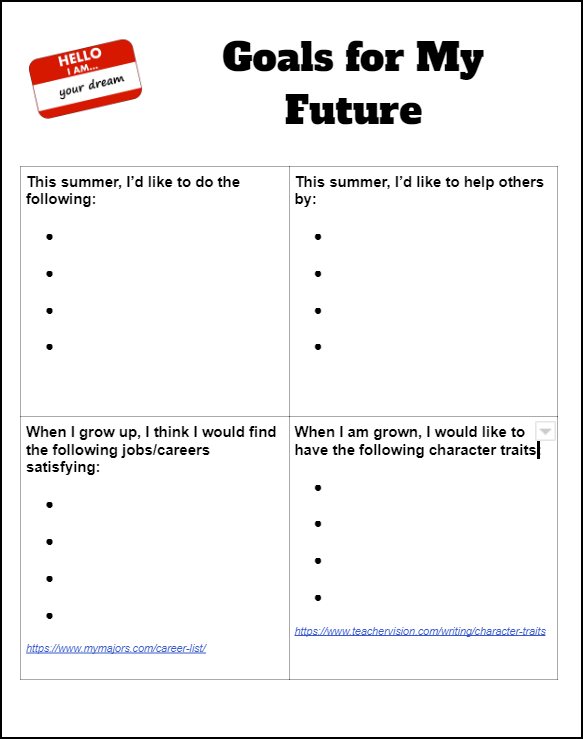I think it is safe to say that this has been a very different school year than what we are used to. Social distancing, sheltering in place, last-minute remote learning, it’s enough to make everyone ready for summer. Even amid the chaos, though, here are some ideas to help you provide a meaningful closure for this virtual year to your students.
Personal Appreciation and Recognition for This Virtual Year

In my traditional teaching, I like to end the year by writing a note to each student. Yes, it takes time, but it is a very personal way to help solidify what you’ve invested in them. It’s not so much about the content, but is more about the person you tried to help them become throughout the year. Speaking your appreciation is good, but writing it down for them so they can reflect upon it (even years later) is a much more powerful method.
I remember having 174 middle school students and found that I had to start the process several weeks in advance in order to get a note written and ready to give to each student the last week of school. For a few students who enjoyed getting on my last nerve, it took longer to wordsmith an honest but encouraging message to them.
No, I’m not suggesting that you take the next few weeks to do this. That would be adding a LOT more stress to an already stressful spring. What I am suggesting, though, is for you to consider how you might craft a message, even if it is to a class as a whole. Maybe you aren’t writing to each individual student, but are instead reflecting on what you enjoyed about the class, ways you’ve seen them grow over the year, some good times, and some struggles that they’ve had to come through.
Fortunately, there are probably things that are true to share with each class so you are just tweaking it a bit to make it more personalized for each different class period. Consider sharing your thoughts on what you’ll remember most about the class and possibly ways that you’ve grown as a teacher (and a person?) because of them. Emphasize the “people” portion of the year and not the virtual learning that had to take place.
Encouragement for the Summer

We remember what it was like being out for the summer. We weren’t interested in avoiding the summer slide (the decline in learning that happens over the summer). But as a teacher, we definitely want to encourage students to be mentally active over the next few weeks.
Consider curating a list of YouTube videos, websites, or even books available at the public library that you can share with the parents. Hint: As you share this with the parents, you may need to start by saying how much you enjoyed their child in your class and you look forward to hearing great things about them (or however you need to word it) and then share the resources as some ideas to consider sharing with their child(ren).
Fortunately for us, you may have already started including unique learning activities through remote learning. If not, think about how your students can be creative, explore, and create over the summer.
Goals for the Future
Send the following template to your students and ask them to write down some ideas about their summer and future. Encourage students to keep the document and refer to it often. You might be surprised at how it pops up in a few years as students come back to you and share what they wrote down and how it has helped them. The four areas of the template include:
- This summer, I’d like to do the following…
- This summer, I’d like to help others by…
- When I grow up, I think I would find the following jobs/careers satisfying…
- When I am grown, I would like to have the following character traits…
For the section on jobs and careers, MyMajors has a nice tool to help narrow down what might be an interesting tool. For each career, MyMajor shares details of an overview, what education is required, schools where you can attend to get the training/certification/skills, what skills are typical for that career, and the median annual and hourly salary, and how many are employed nationally in that career. On the overview tab, you’ll even find a Holland Code chart to help you see if that career is a good fit for you. Holland Code refers to a theory of careers and vocational choice (based upon personality types) that was initially developed by American psychologist John L. Holland.
Students may have a tough time identifying character traits they admire most and want to develop. A link is provided to a list developed by TeacherVision. This list includes values, morals, and beliefs character traits (i.e.: honest, brave, compassionate, etc.), physical and emotional character traits (i.e.: imaginative, tireless, joyful, etc.), and personality character traits (i.e.: thoughtful, humorous, helpful, etc.).
Make an Impact

Think of closing out your virtual year as one last chance to make a big impact on your students. Which of the three ideas above have you done in the past with your learners? Is there another way that you close out your year with your students to make it special? Let us know in the comments and share it with others. We’d love to hear from you!
Photo by Frederick Tubiermont on Unsplash


